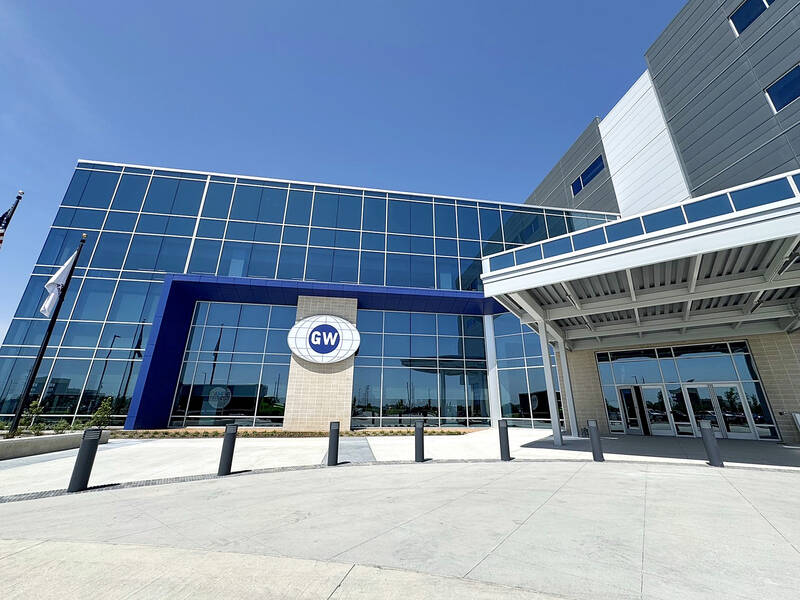GlobalWafers Co (環球晶圓), the world’s third-largest silicon wafer supplier, yesterday said that it plans to invest an additional US$4 billion in the US, citing growing demand from US customers seeking locally produced wafers amid ongoing uncertainty over US tariff policies.
The announcement was made at the opening ceremony of the company’s new advanced 12-inch wafer fabrication plant in Sherman, Texas. The latest commitment would bring GlobalWafers’ total investment in the US to US$7.5 billion, the company said.
“We have seen fervent demand from American customers for our local capacity in the US. Although the product verification process is still underway, those American companies have shown strong interest in booking more local capacity,” GlobalWafers chairwoman Doris Hsu (徐秀蘭) told reporters during a conference call yesterday.

Photo courtesy of GlobalWafers Co
“They are hoping to secure more local supply in order to reduce tariff uncertainty,” Hsu said.
GlobalWafers supplies silicon wafers to major chipmakers, including Taiwan Semiconductor Manufacturing Co (TSMC, 台積電). TSMC, the world’s largest contract chipmaker, plans to build six wafer fabrication plants, as well as a chip packaging facility and a research- and-development center in the US, with a total investment of US$165 billion.
Citing data from the White House, GlobalWafers said that Nvidia Corp and several other semiconductor companies have pledged to boost their US investments to at least US$500 billion.
Three years ago, GlobalWafers announced a US$3.5 billion investment to fund the first and second phases of its flagship expansion project in the US, supported by the CHIPS Act.
The first fabrication facility is now operational and scheduled to begin high-volume production in the second half of this year, the company said.
The additional US$4 billion investment would fund phases three and four of GlobalWafers’ expansion in Sherman, where the company operates a 57-hectare manufacturing campus, the company said.
Upon completion of all four phases, monthly production capacity is expected to surge to more than 1 million 12-inch wafers, it said.
“This is an aggressive and bold target, but we will not hastily pour all of the US$4 billion in. We will not make any further investment if we do not translate every phase of expansion into earnings or secure [sufficient] long-term supply agreements,” Hsu said.
GlobalWafers has not set a timeline for the construction of new wafer fabrication facilities under phases three and four. Consistent with its past approach, the company typically proceeds with new capacity expansion only after securing long-term supply agreements, with most of the capacity prebooked by customers and supported by prepayments.
As the only advanced wafer manufacturer operating in the US, the additional investment, bolstered by continued support from the US government and US President Donald Trump’s administration, is expected to help ensure a stable supply of advanced wafers critical to powering a wide range of next-generation technologies and innovations, GlobalWafers said.

POWERING UP: PSUs for AI servers made up about 50% of Delta’s total server PSU revenue during the first three quarters of last year, the company said Power supply and electronic components maker Delta Electronics Inc (台達電) reported record-high revenue of NT$161.61 billion (US$5.11 billion) for last quarter and said it remains positive about this quarter. Last quarter’s figure was up 7.6 percent from the previous quarter and 41.51 percent higher than a year earlier, and largely in line with Yuanta Securities Investment Consulting Co’s (元大投顧) forecast of NT$160 billion. Delta’s annual revenue last year rose 31.76 percent year-on-year to NT$554.89 billion, also a record high for the company. Its strong performance reflected continued demand for high-performance power solutions and advanced liquid-cooling products used in artificial intelligence (AI) data centers,

SIZE MATTERS: TSMC started phasing out 8-inch wafer production last year, while Samsung is more aggressively retiring 8-inch capacity, TrendForce said Chipmakers are expected to raise prices of 8-inch wafers by up to 20 percent this year on concern over supply constraints as major contract chipmakers Taiwan Semiconductor Manufacturing Co (TSMC, 台積電) and Samsung Electronics Co gradually retire less advanced wafer capacity, TrendForce Corp (集邦科技) said yesterday. It is the first significant across-the-board price hike since a global semiconductor correction in 2023, the Taipei-based market researcher said in a report. Global 8-inch wafer capacity slid 0.3 percent year-on-year last year, although 8-inch wafer prices still hovered at relatively stable levels throughout the year, TrendForce said. The downward trend is expected to continue this year,

Vincent Wei led fellow Singaporean farmers around an empty Malaysian plot, laying out plans for a greenhouse and rows of leafy vegetables. What he pitched was not just space for crops, but a lifeline for growers struggling to make ends meet in a city-state with high prices and little vacant land. The future agriculture hub is part of a joint special economic zone launched last year by the two neighbors, expected to cost US$123 million and produce 10,000 tonnes of fresh produce annually. It is attracting Singaporean farmers with promises of cheaper land, labor and energy just over the border.

A proposed billionaires’ tax in California has ignited a political uproar in Silicon Valley, with tech titans threatening to leave the state while California Governor Gavin Newsom of the Democratic Party maneuvers to defeat a levy that he fears would lead to an exodus of wealth. A technology mecca, California has more billionaires than any other US state — a few hundred, by some estimates. About half its personal income tax revenue, a financial backbone in the nearly US$350 billion budget, comes from the top 1 percent of earners. A large healthcare union is attempting to place a proposal before